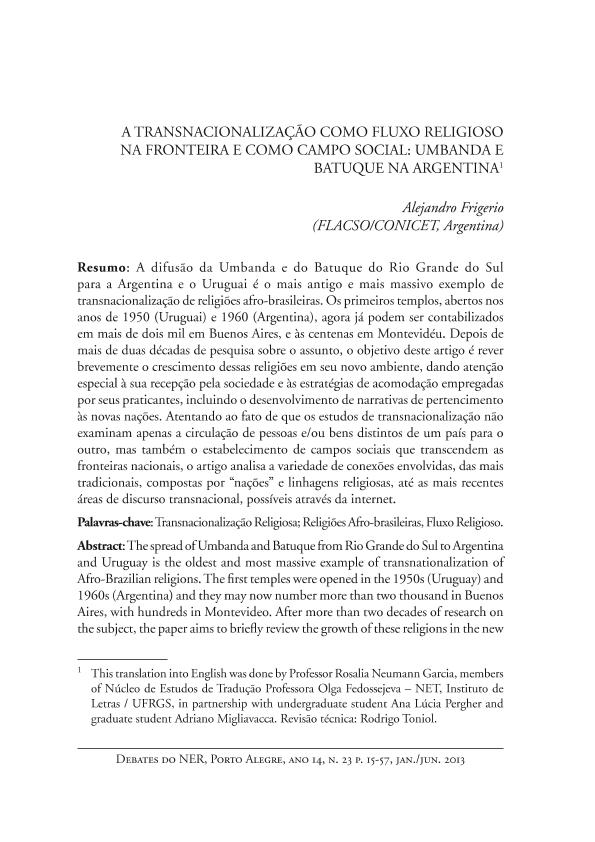Mostrar el registro sencillo del ítem
dc.contributor.author
Frigerio, Alejandro

dc.date.available
2017-11-01T23:53:25Z
dc.date.issued
2013-07
dc.identifier.citation
Frigerio, Alejandro; A transnacionalização como fluxo religioso na fronteira e como campo social: Umbanda e Batuque na Argentina; Universidade Federal do Rio Grande do Sul. Instituto de Filosofia e Ciências Humanas. Programa de Pós-Graduação em Antropologia Social; Debates do NER; 1; 23; 7-2013; 15-57
dc.identifier.issn
1519-843X
dc.identifier.uri
http://hdl.handle.net/11336/27364
dc.description.abstract
A difusão da Umbanda e do Batuque do Rio Grande do Sul para a Argentina e o Uruguai é o mais antigo e mais massivo exemplo de transnacionalização de religiões afro-brasileiras. Os primeiros templos, abertos nos anos de 1950 (Uruguai) e 1960 (Argentina), agora já podem ser contabilizados em mais de dois mil em Buenos Aires, e às centenas em Montevidéu. Depois de mais de duas décadas de pesquisa sobre o assunto, o objetivo deste artigo é rever brevemente o crescimento dessas religiões em seu novo ambiente, dando atenção especial à sua recepção pela sociedade e às estratégias de acomodação empregadas por seus praticantes, incluindo o desenvolvimento de narrativas de pertencimento às novas nações. Atentando ao fato de que os estudos de transnacionalização não examinam apenas a circulação de pessoas e/ou bens distintos de um país para o outro, mas também o estabelecimento de campos sociais que transcendem as fronteiras nacionais, o artigo analisa a variedade de conexões envolvidas, das mais tradicionais, compostas por “nações” e linhagens religiosas, até as mais recentes áreas de discurso transnacional, possíveis através da internet.
dc.description.abstract
The spread of Umbanda and Batuque from Rio Grande do Sul to Argentina and Uruguay is the oldest and most massive example of transnationalization of Afro-Brazilian religions. The fi rst temples were opened in the 1950s (Uruguay) and 1960s (Argentina) and they may now number more than two thousand in Buenos Aires, with hundreds in Montevideo. After more than two decades of research on the subject, the paper aims to briefl y review the growth of these religions in the new settings, paying special attention to their social reception and to the accommodation strategies employed by their practitioners, including the development of narratives of belonging to the new nations. Noting that transnationalization studies examine not only the circulation of people and/or different goods from one country to another but also the establishment of social fi elds that transcend national boundaries the paper also analyzes the variety of networks involved, from the more traditional ones composed of religious lineages and ’nations’ to the more recent arenas of transnational discourse made possible by the internet.
dc.format
application/pdf
dc.language.iso
por
dc.publisher
Universidade Federal do Rio Grande do Sul. Instituto de Filosofia e Ciências Humanas. Programa de Pós-Graduação em Antropologia Social
dc.rights
info:eu-repo/semantics/openAccess
dc.rights.uri
https://creativecommons.org/licenses/by/2.5/ar/
dc.subject
Religión
dc.subject
Transnacionalización Religiosa
dc.subject
Religiones Afro-Brasileras
dc.subject
Flujo Religioso
dc.subject.classification
Demografía

dc.subject.classification
Sociología

dc.subject.classification
CIENCIAS SOCIALES

dc.title
A transnacionalização como fluxo religioso na fronteira e como campo social: Umbanda e Batuque na Argentina
dc.type
info:eu-repo/semantics/article
dc.type
info:ar-repo/semantics/artículo
dc.type
info:eu-repo/semantics/publishedVersion
dc.date.updated
2017-11-01T16:52:17Z
dc.identifier.eissn
1982-8136
dc.journal.volume
1
dc.journal.number
23
dc.journal.pagination
15-57
dc.journal.pais
Brasil

dc.journal.ciudad
Puerto Alegre
dc.description.fil
Fil: Frigerio, Alejandro. Pontificia Universidad Católica Argentina "Santa María de los Buenos Aires"; Argentina
dc.journal.title
Debates do NER

dc.relation.alternativeid
info:eu-repo/semantics/altIdentifier/url/http://seer.ufrgs.br/debatesdoner/article/view/40972
dc.relation.alternativeid
info:eu-repo/semantics/altIdentifier/doi/http://dx.doi.org/10.1234/dner.v1i23.40972
Archivos asociados
